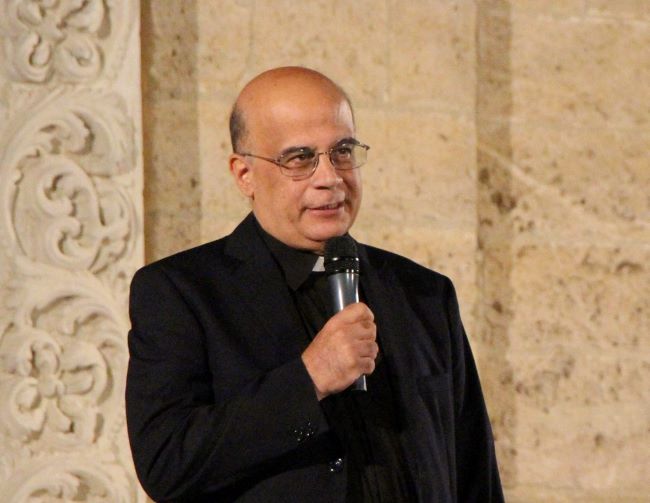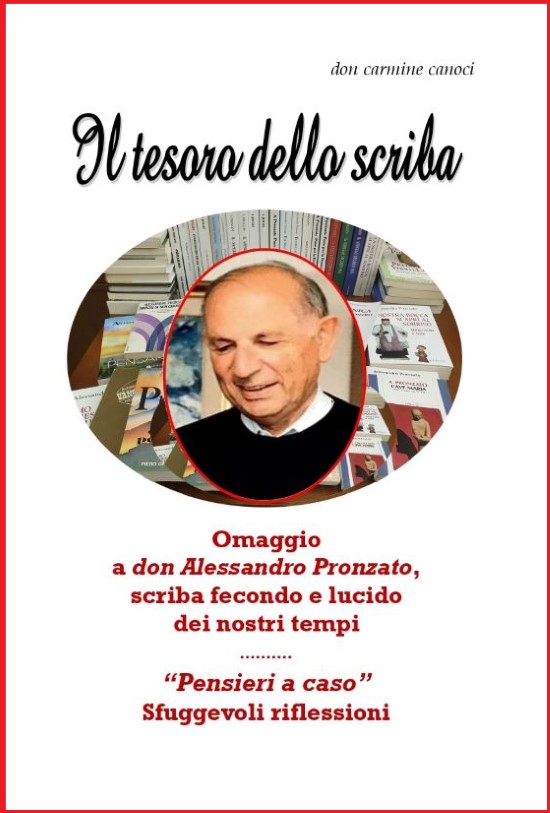Writer’s Treasure. It is a new book by Don Carmine Canosi, recently published with two translations “Homage to Don Alessandro Pronzato, the fruitful and lucid writer of our time” and “Ordinary Thoughts. Elusive Reflections”. The volume (self-published, pp. 272), which begins with an introduction by Professor Cosimo Faggiano and an introduction to the author, is in three parts, all inspired or dedicated to the works of Alessandro Brunato, prolific priest and writer, author of about 135 books who died in 2018 at the age of 86. Perhaps he is a “unique” author in the Italian and international “religious” literary scene.
Luciano Moya in his article “Farewell to the Priest-writer Brunato: Explanation of the Gospel by Fidel”, published by “Avvenire” on September 26, 2018 and reported in the first part of the book Don Carmine (pp. XXXVI-XLII), defines him as “one of the most widely read priestly writers of the twentieth century.” Moya recalls, among Other things, that Bronzato, in his works, all written from 1965 onwards, “has threaded and woven the words together into gospel and smile several times, and has done so in such a convincing manner that today it seems almost impossible to expect to exclude the way of humor among those who lead to God.” “.

Don Pronzato
In another article (by the editorial team) published on the same day by La Stampa, titled “Don Alessandro Pronzato, priest and writer revered by the popes, died(This is also stated in the first part of the volume written by Don Carmine, on pages XXXI-XXXV), it is emphasized: “Among his many books are commentaries on the Gospels, on the Bible, collections of anthologies, and biographies of male and female saints They are often unknown characters who make their story known through their unique way of writing, sometimes even humorous and sarcastic. His jokes and anecdotes are well known to us, who rejoiced that we were together in company (…). He was also very fond of giving voices to extraordinary characters, for for him the evangelical message was also transmitted through everyday objects and characters. (…) Pope Francis, on his historic trip to Cuba, where he met Fidel Castro, made a special tribute to Commander Maximo: three books that accompanied him as a young priest, two of which were written by Don Sandro, Uncomfortable Bibles And Our mouths opened into smiles, the latter a very special book that made him known even among casual readers (both were translated into Spanish when they appeared). (…) But Don Pronzato’s great love was always towards Maria, to whom he dedicated many of his books including his most recent It’s all in Mary’s School of Learning Joy (..)”.
Perhaps these few excerpts cited here are enough to understand the scope of Don Pronzato’s work. A work that constantly represents an indispensable point of reference for Don Carmine, throughout his long pastoral and human journey, from which the parish communities benefited, not only in Salles Salentino, who saw him as a hero in various religious, local, social and cultural fields.
Don Carmine Canosi, who owns almost all the books of the Piedmontese author, has constantly “fed” the simple, deep and tense pages of Don Pronzato. All this explains why this new book of his, which must be emphasized, is not merely a tribute from the “disciple” to the “master.” Don Carmine’s work, written in a fluid, pleasant language and “no frills”, in fact offers precious opportunities and surprising ideas to feed independent reflections on the part of the reader.
“The texts of Pronzato, selected with great care by Don Carmine, from the author’s mass production, born in Rivalta in 1932 – writes Professor Faggiano in the preface – represent the crystalline source of the proposed Christianity and live it in its originality, without formalities and husks on the facade and moving with the efficacy of bearer communication in the spheres of communication The intersection of society and industrious religiosity, and those of Don Carmine reveal the freshness of direct Christian life, spontaneity, tenacity and coherence, embodied in love and understanding of the other.Don Carmine’s admiration for Brunato never takes the form of mere imitation, but is always transformed into new creative reflections that shed light on more The hidden aspects and the sharp foresight that prompts the attentive reader in the face, of course, to say: I didn’t think about it, but that’s how it is.”
On the work of Don Pronzato, Don Carmine wrote in the preface, among other things: “Over the years I have read his books and user mostly. It was hard to break away from his rhetoric steeped in gospel, theology, ecclesiology, hagiography…and healthy realism imparted concretely, taking, always for building purposes, the liberty of elegantly removing stones and pebbles from one’s shoes. The use of amusing humor is frequent in his works. In him, too, one could recognize what was said about people of the same rank: he knew how to hold a pen well between his head and hands. In his texts, the argument is always fresh, fresh, illuminating, alert and meticulous, such as urging the reader to discover the truth in a playful and convincing way.
As mentioned, the book is divided into three parts. In addition to the first part entitled “It has been said of him” in which testimonies about Pronzato are proposed, the second and third sections contain, respectively, a carefully selected collection of “Don Pronzato’s texts” and “Casual Thoughts”. Each text of Part Two of the book closes with a “cloud”, alternately called “The Church I Dream About” or “The Church That Makes Me Smile”, accompanied by “effective” annotations with quotes from episodes/anecdotes or ideas. Regarding the original and fantastic “clouds,” Don Carmine explains: “The intention is to share with the reader a dream of a dream or a benevolent smile of Bronzato contemplating the church.”
The last part “Random Thoughts”, concerning personal considerations “in the wake of the spirit raised by Bronzato”, is the direct outgrowth of Don Carmine’s pen. The following texts are presented to the reader: “Is it wrong to be a priest?” “,” Silence is Many Things Less Than Silence “,” Dear Dawn “,” It’s Always Time to Convert “,” Worry, Worry, Give Up, And That’s Why. Is?”, “Active and Passive Marginalization”, “What Happened to These Two?” “,” Catechism in the first age, the tree remains but… “,” Speaking of Friendship “,” When Faith Exaggerates “,” Sooner or Later I Have to Learn to Dance “,” Self-Examination ”.
Don Carmine’s new work, “The Writer’s Treasure,” bears, on the first page after the title page, the dedication “In memory of Aurora, my sister, the ‘humble maid’.”
Rosary Faggiano
© Reproduction Reserved
Pictured: Don Carmine Canosi
Don Carmine Canosi previously posted: “Do you believe in God? Testimonials and testimonies of faith present or absent(2019); “Ludamus You!! Prayer proposal for today, with today’s concerns, waiting for tomorrow(2020); “Ludamus You!! eshaa pray(2020);The word of God and the word of man together we can. Readings from a Christian Revelation…” (2021); “Thinking… A simple and common story told on tiptoe not as a lost refugee nor as a great winner(2022).
Carmine Canosi was born in Saliento on February 21, 1949, and was ordained a priest on September 7, 1974. “Saint Nicholas” Brindisi and the following year in San Pancrazio Salentino in the parish “SS. Pancrazio and Francesco d’Assisi”. In 1987 he was appointed parish pastor. “Saint Joseph Salles Salentino and in 2001 for the parish “Santa Maria Assunta, always from Willow. He stayed there until 2018 when, for family reasons, he asked to be relieved of the position of parish priest. Since then he has continued to perform his ministry as pastoral assistant to his supporters and to the various circumstances that required his presence.

“Infuriatingly humble alcohol fanatic. Unapologetic beer practitioner. Analyst.”




